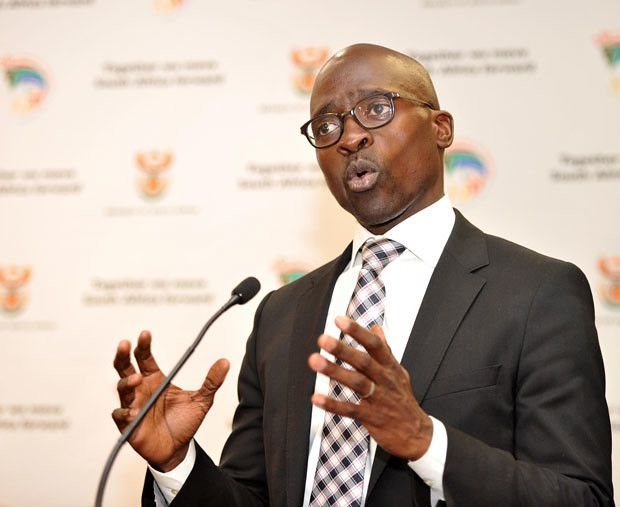Gigaba takes the stand

This is how former public enterprises minister Malusi Gigaba kicked off his testimony on Friday, 21 May 2021, at the state capture commission, answering a question on how many times during his term he visited the Gupta home in Saxonwold. His appearance was related to issues surrounding Transnet in the time that he held the portfolio, between 2010 and 2014.
Gigaba’s testimony followed on the heels of that of his estranged wife Noma Mngoma, who has spilled the beans on Gigaba’s alleged corrupt relationship with the Guptas and their influence over his work. He described her allegations against him as that of someone with a creative imagination.
“Chair, I’m a bit conflicted here, because I would want an opportunity, ample opportunity to respond to Ms Mngoma’s creative imagination. I want to deal with what she testified here. The extensive lies, the inaccuracies, the fabrications. Suffice to say it was not more than 20 times as she claims.”
Mngoma told the commission on Thursday that Gigaba had visited the Guptas more than 20 times, and she accompanied him on some occasions.
“While I was minister of public enterprises, my interactions with them did not increase or decrease, because as I say, I knew them. What I’m not denying here is that I knew them, as many people knew them.”
He said he had known the brothers for a while, and met their mother on one occasion. The interactions with the Gupta brothers took place in a variety of circumstances, from ANC events, to the New Age business breakfasts while he was in the Department of Public Enterprises (DPE), to social and cultural events. They were never to discuss the business of government.
“As the previous witness indicated, I live a modest life, I have no businesses so I had no javelin to throw because I think my departure from government in 2018 was unexpected, even by myself.”
Gigaba scaled down his interactions with the family during the course of 2014 as he was busy with ANC election campaigning as its head of elections for that year, in addition to his work. Mngoma’s recollection, however, was that Gigaba fell out of favour with the Guptas around this time as he started to fail in delivering on their wishes for the state-owned entities under the DPE, and was eventually cut off.
Evidence leader Advocate Anton Myburgh questioned Gigaba on his role in the R54-billion Transnet locomotives tender, concluded in 2014. The commission has heard extensive evidence on the procurement process in the matter, which was allegedly clouded with irregularities.
“When I became minister of public enterprises, the decision to procure the 1,064 locomotives was already there. It was not invented by myself, the decision was there, the process was there ... to the extent that there was any wrongdoing, it was certainly not the intent of the decision process and it was not to my knowledge,” Gigaba said.
Myburgh pointed out that Gupta associate Salim Essa was a key player in the contract. He allegedly inserted himself into various elements of the process to eventually emerge with over R1-billion in kickbacks.
“I was not privy to Mr Essa’s involvement in this locomotive procurement process. My understanding was that the Transnet board, through its various committees, including the procurement sub-committee, was involved in this process.”
Gigaba added that he learned for the first time the intricacies of the procurement process from the commission’s hearings. He agreed with commission chairperson Deputy Chief Justice Raymond Zondo that in the context of all that has been shared to date, it is unfortunate that the Guptas are choosing not to participate in the proceedings.
Myburgh then moved on to the 2011 reinstatement of Siyabonga Gama as CEO of Transnet subsidiary Transnet Freight Rail, following a dismissal related to procurement irregularities. Gigaba denied that he was instructed by former president Jacob Zuma to ensure Gama’s reinstatement, when he took office in the DPE in November 2010. Gama had been gone since June of that year, and for months media reports flared up with comments from political and government quarters criticising his dismissal. In the evidence of then incoming board chairperson Mafika Mkwanazi, Gigaba told him in a meeting between the two of them that he was concerned about Gama’s matter and wanted the board that will start in December that year to look into it.
Zuma had removed Gigaba’s predecessor Barbara Hogan on 31 October, in the midst of a pending cabinet decision on the board to be appointed. She told the commission in 2018 that a memorandum that she had submitted to Cabinet with names of board hopefuls was withdrawn.
“I wonder, if she was no longer in Cabinet on 31 October, how she knows that the memorandum was withdrawn, but it naturally would have been withdrawn, given that there had been changes in the national executive,” Gigaba explained. He added that it was impossible that his meeting with Mkwanazi happened before he took over from Hogan, as Mkwanazi had previously alleged, raising questions from Zondo at the time on the irregularity of Gigaba offering him a board position and instructing him to pursue a resolution on the Gama issue.
Gigaba said he only learned from Zuma on the afternoon of 31 October that he’d be sworn in the next day. “I think Mr Mkwanazi made a genuine confusion of dates ... even if you look at the issues that Mr Mkwanazi says we discussed, these would not have been possible to discuss at a first meeting, especially not prior to your appointment.
“My discussion insofar as Mr Gama was concerned, was drawn from media reports that were circulating at the time, and I was highlighting to him how sensitive, how controversial this issue was. It was a burning issue. A number of organisations including the allies of the ruling party had made comments about it. I think a few ministers had also spoken publicly about the matter.”
So dynamic was the period at this time for Transnet that even its acting CEO Chris Wells resigned on the day of Gigaba’s swearing in, throwing a spanner in the works for the new minister. But under no circumstances could he have had a say in how internal matters in the company should go, as he was not privy to their details.
“I gave no instruction, I did not use the words that Transnet must rescind the dismissal of Mr Gama. I think that would have been much firmer had I used those words.”
The genesis of a proposition that he interfered in the Gama labour issue, explained Myburgh, was in Hogan’s testimony that back in 2009 while he was going through a disciplinary process, Gama was Zuma’s number one candidate for the Transnet top post. When Hogan and the board of that time pushed back against Zuma’s wishes, no appointment was made. Zuma allegedly said at the time he’d rather wait for the Gama process to conclude before making an appointment.
“I think the commission would be fair not to take Ms Hogan’s submission as the gospel truth,” said Gigaba.
He is expected to continue his testimony at a later date still to be decided.
This article was originally published on Corruption Watch.






































